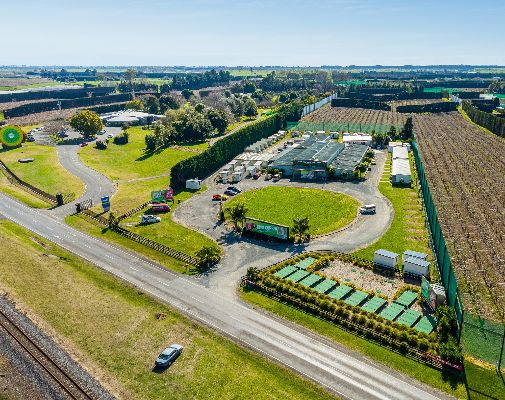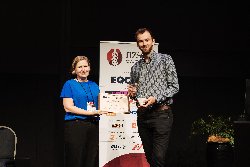One of the biggest commercially-operated seasonal worker’s accommodation sites and businesses in New Zealand – which simultaneously runs a backpackers venue for the tourism sector - has been placed on the market for sale.

The land, buildings and business, known as Kiwi Corral Country Backpackers is located on the outskirts of Te Puke in the Bay of Plenty – New Zealand’s foremost kiwifruit growing region.
The 12,140-square metre property at 26 Young Road in Paengaroa is adjacent to the headquarters of one of New Zealand’s biggest fully-integrated orchard-to-market service companies, Seeka – which is instantly recognisable to the public for the giant kiwifruit monument outside its offices.
Established in 2007, Kiwi Corral Country Backpackers has evolved from purely servicing the budget tourism accommodation sector, into its current role as being one of the biggest single-site seasonal worker’s complexes in New Zealand.
The Kiwi Corral Country Backpackers complex has a wide range of accommodation buildings and support amenities licensed to house up to 500 fruit picking, packing, and orchard maintenance workers in the Bay of Plenty horticultural sector. Building infrastructure within the Kiwi Corral Country Backpackers compound encompasses:
- A main central warehouse type structure housing male and female bunk dormitories, segregated men’s and women’s shower and toilet amenities, a kitchen, a recreation room, laundry amenities, refrigerated food storage amenities, lounge, and the business’s administrative offices
- A three-bedroom on-site manager’s residence
- 15 internal bunk rooms with capacity to house 8 - 10 people in each room
- An attached 20-bed bunk house
- 13 external bunkrooms – three housing 10-beds and 10 housing six-bed configurations.
and
- 24 freestanding cabins.
Most of those staying at Kiwi Corral are part of New Zealand’s Recognised Seasonal Workers (RSE) scheme which provides 17 percent of the seasonal workforce for kiwifruit picking and packaging.
Now the freehold land, building infrastructure, and going concern Kiwi Corral Country Backpackers business at 26 Young Road in Paengaroa have been placed on the market for sale by international tender through Bayleys Auckland and Bayleys Tauranga – with tenders closing on October 15.
Bayleys salespeople Jayson Hayde, Paul Dixon, and Snow Williams said strict Government regulations now in place for the management of international seasonal workers had further strengthened Kiwi Corral’s position in the market.
“Immigration New Zealand regulations for international workers states that RSE-classified personnel can’t live in private residential dwellings unless that condition was included in the recruitment agreement prior to September last year. Similarly, new RSE-classified personnel can’t rent private residential dwellings,” said Hayde.
“That means professional accommodation providers such as Kiwi Corral bear the responsibility for the provision of those services. The additional services provided by Kiwi Corral place it at the top of the list for orchard and packhouse owners around the Te Puke region.
“The sale of Kiwi Corral is an opportunity for some of the larger local kiwifruit growers or packhouse operators in the Bay of Plenty to vertically integrate their business activities – giving them control over the production process of their crops and adding to their core revenue stream.”
In addition to the accommodation services, Kiwi Corral Country Backpackers also provides worker transportation to the multiple orchards and packhouses around Te Puke, and also providers transport for guests to Te Puke’s supermarkets for the provision of food and personal supplies.
Hayde said that with 2000 beds available to seasonal workers in the Bay of Plenty, Kiwi Corral in its current format had a 25 percent share of the market. The next biggest accommodation providers in the region could only house up to 200 personnel.
Meanwhile, packhouses could only build on-site staff accommodation facilities for up to 75 RSE workers – with the associated up-front consenting application and construction costs deterring many fruit growers from developing facilities themselves.
“Both these factors further underpin the long-term viability and on-going customer suppler for Kiwi Corral’s services.” he said.
Data from the New Zealand Kiwifruit Growers Institute reveals that the New Zealand kiwifruit industry – most of which is based in and around Te Puke – will require an additional 8,380 seasonal fruit picking and packaging workers by 2027. The production side of the New Zealand kiwifruit industry is braced for enormous expansion in the next decade – with growers investing substantially to increase the sector’s value to $4.5 billion by 2027.
Williams said the downstream effect of investment in production was the associated staffing requirements required to pick and pack the growing crop harvest.
He said the Kiwi Corral Country Backpackers business would be sold with on-going formal contracts in place to provide accommodation services to multiple kiwifruit growing orchards in and around the Te Puke area.
“Those contracts are very specific – outlining what accommodation services are provided by Kiwi Corral, how many personnel the orchard or packhouse can have staying at the venue, the duration of the employees’ stay, and payment terms. Those protocols allow the Kiwi Corral business to accurately plan for the allocation of its bed availability for near total capacity throughout the season, and to ensure smooth business continuity throughout the year,” he said.
Reflecting the higher tonnage of kiwifruit being picked in the Eastern bay of Plenty, Kiwi Corral’s revenue grew 35 percent from the 2017/18 financial year compared to the just completed 2019/20 financial year. The business’s day-to-day operations are run by a full-time on-site manager.
Dixon said there was a substantial portion of undeveloped flat land within the Kiwi Corral property which could sustain more accommodation units – either in the existing standalone cabin format, or subject to council consents, the construction of more dormitory style buildings.



 John Mazenier: Gaffer Tape And Glue Delivering New Zealand’s Mission Critical Services
John Mazenier: Gaffer Tape And Glue Delivering New Zealand’s Mission Critical Services Earthquake Commission: Ivan Skinner Award Winner Inspired By Real-life Earthquake Experience
Earthquake Commission: Ivan Skinner Award Winner Inspired By Real-life Earthquake Experience Reserve Bank: Consultation Opens On A Digital Currency For New Zealand
Reserve Bank: Consultation Opens On A Digital Currency For New Zealand NIWA: Ship Anchors May Cause Extensive And Long-lasting Damage To The Seafloor, According To New Research
NIWA: Ship Anchors May Cause Extensive And Long-lasting Damage To The Seafloor, According To New Research New Zealand Customs Service: A Step Forward For Simpler Trade Between New Zealand And Singapore
New Zealand Customs Service: A Step Forward For Simpler Trade Between New Zealand And Singapore Horizon Research: 68% Say Make Banks Offer Fraud Protection
Horizon Research: 68% Say Make Banks Offer Fraud Protection



